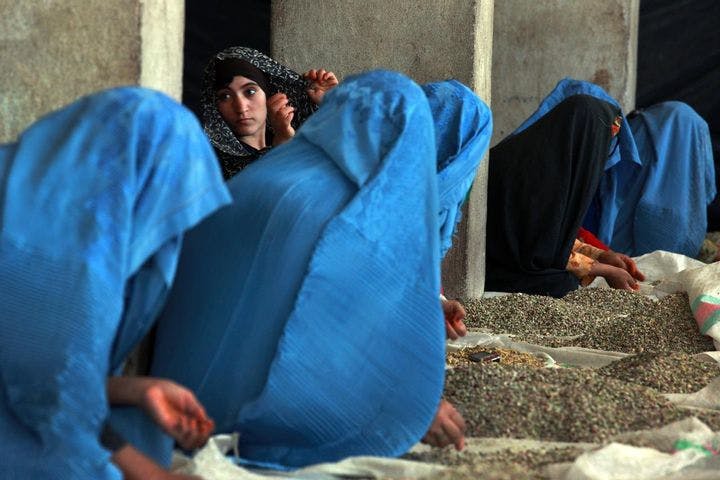Spring 2010
Agents for Change
– Christina Asquith
In the traditional, deeply religious Middle East, change is coming from within. Muslim women are running for office, starting careers, and taking to university lecterns by embracing Islam, the very belief system that many in the West see as subordinating them.
As the United States continues its wars in Afghanistan and Iraq, promises to broaden women’s rights in these two predominantly Muslim countries have not materialized. Millions of women in the greater Middle East still lack access to schooling and a political voice, are forced into child marriages, and are victims of honor killings and genital mutilation. In Paradise Beneath Her Feet, Isobel Coleman argues that in this traditional, deeply religious region, change is coming from within, but not in the ways many Westerners may expect or desire. Muslim women are running for office; starting careers in banking, law, and medicine; and taking to university lecterns by embracing Islam, the very belief that many in the West see as subordinating them.
Coleman calls these women “Islamic feminists,” using a term popularized by female Muslim scholars and activists. Some of the women Coleman profiles are well traveled, speak English, and are only moderately religious, but recognize the power of making an Islamic argument in order to subvert their society’s patriarchal norm. They are reinterpreting the Qur’an and invoking examples from the Prophet Muhammad’s own life to argue that women belong in business, the military, and other public spheres. Others Coleman writes about are more devout—they wear chadors, speak softly, and denounce Western women as anti-family, sinful, and spiritually vacuous. They seem less like feminists and more like fundamentalists who happen to be women.
Though it’s clear she admires the Islamic feminists she profiles, Coleman, a senior fellow for U.S. foreign policy at the Council on Foreign Relations who focuses on the Middle East and gender issues, presents balanced reportage inflected with nuanced analysis of the subtle ways in which Muslim women are advancing. The book begins with a short history of women’s rights in the Middle East, in which Coleman points out that Western intervention to promote women has typically had the opposite effect, by associating feminism with colonialism in the minds of Muslims. She convincingly argues, however, that expanding the opportunities for women has the ancillary benefits of improving literacy rates, reducing child malnutrition, and stabilizing governments.
The bulk of the book is given over to profiles of women activists from Saudi Arabia, Iraq, Afghanistan, Iran, and Pakistan. Coleman has visited each of these countries except Iraq, and her prose is lively with on-the-ground scenes and the voices of the women she interviewed. She introduces women such as Afghanistan aid worker Sakeena Yacoobi, who teaches women, most of whom are illiterate, about the rights given to them in the Qur’an, and Haifa Jamal al Lail, the dean of an all-women university in Saudi Arabia, where women are trained to pursue high-powered careers in business and the sciences, yet are forbidden to show their hair, drive, or travel without a male guardian.
Coleman concedes that “some Islamic feminists will undoubtedly disappoint Western observers with their anti-Western, anti-globalization, and anti-Zionist views. Some do not condemn armed struggle as terrorism. Some of the more conservative women condone certain deeply entrenched social practices, like polygamy, that others believe to be repressive.” For example, Iraqi member of Parliament Salama Al Khafaji, who covers her hands and ankles and refuses to shake hands with men, has been accused of being a puppet of the male clerics.
But, Coleman points out, piety is precisely what makes these women popular in countries from Pakistan to Morocco where most of society is deeply conservative. Whether that makes them women whom those in the West want to champion is another question. Coleman could have made more prominent mention of the good work of secular women. (After all, Al Khafaji came to power in Iraq thanks to a 25 percent quota of women in government won by mostly secular and Western women’s activists.) Nor does she address where the rise of Islamic feminism will leave the many Christian, Jewish, and secular women in Muslim countries.
But the women she profiles offer us a rare peek into changing cultures in the Muslim world, and Coleman is an expert at homing in on the tiny details of a scene and then teasing from them a larger meaning. Paradise Beneath Her Feet is a pleasurable read and a scholarly work that will be of interest to those who champion women’s causes abroad. Islamic feminism may not please everyone, but, Coleman writes, “if the advancement of women’s rights in the Middle East depends on the removal of Islam, Muslim women will be waiting a long time indeed.”
* * *
Christina Asquith, a former public policy scholar at the Woodrow Wilson Center, is the author of Sisters in War: A Story of Love, Family, and Survival in the New Iraq (2009).
Reviewed: "Paradise Beneath Her Feet: How Women Are Transforming the Middle East" by Isobel Coleman, Random House, 2010.
Photo courtesy of UN Photo/Eric Kanalstein
